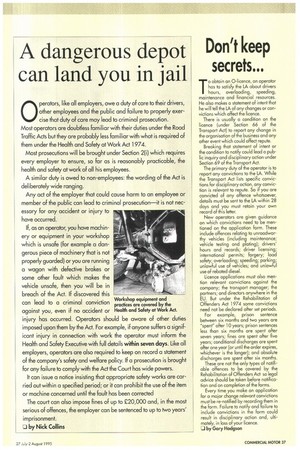A dangerous depot can land you in jail
Page 39

If you've noticed an error in this article please click here to report it so we can fix it.
0 perators, like all employers, owe a duty of care to their drivers, other employees and the public and failure to properly exercise that duty of care may lead to criminal prosecution. Most operators are doubtless familiar with their duties under the Road Traffic Acts but they are probably less familiar with what is required of them under the Health and Safety at Work Act 1974.
Most prosecutions will be brought under Section 2(i) which requires every employer to ensure, so far as is reasonably practicable, the health and safety at work of all his employees.
A similar duty is owed to non-employees: the wording of the Act is deliberately wide ranging.
Any act of the employer that could cause harm to an employee or member of the public can lead to criminal prosecution—it is not necessary for any accident or injury to have occurred.
if, as an operator, you have machinery or equipment in your workshop which is unsafe (for example a dangerous piece of machinery that is not properly guarded) or you are running a wagon with defective brakes or some other fault which makes the vehicle unsafe, then you will be in breach of the Act. If discovered this can lead to a criminal conviction against you, even if no accident or injury has occurred. Operators should be aware of other duties imposed upon them by the Act. For example, if anyone suffers a significant injury in connection with work the operator must inform the Health and Safety Executive with full details within seven days. Like all employers, operators are also required to keep on record a statement of the company's safety and welfare policy. If a prosecution is brought for any failure to comply with the Act the Court has wide powers.
It can issue a notice insisting that appropriate safety works are carried out within a specified period; or it can prohibit the use of the item or machine concerned until the fault has been corrected The court can also impose fines of up to 220,000 and, in the most serious of offences, the employer can be sentenced to up to two years' imprisonment.
Workshop equipment and practices are covered by the Health and Safety at Work Act.
CI by Nick Collins
























































































